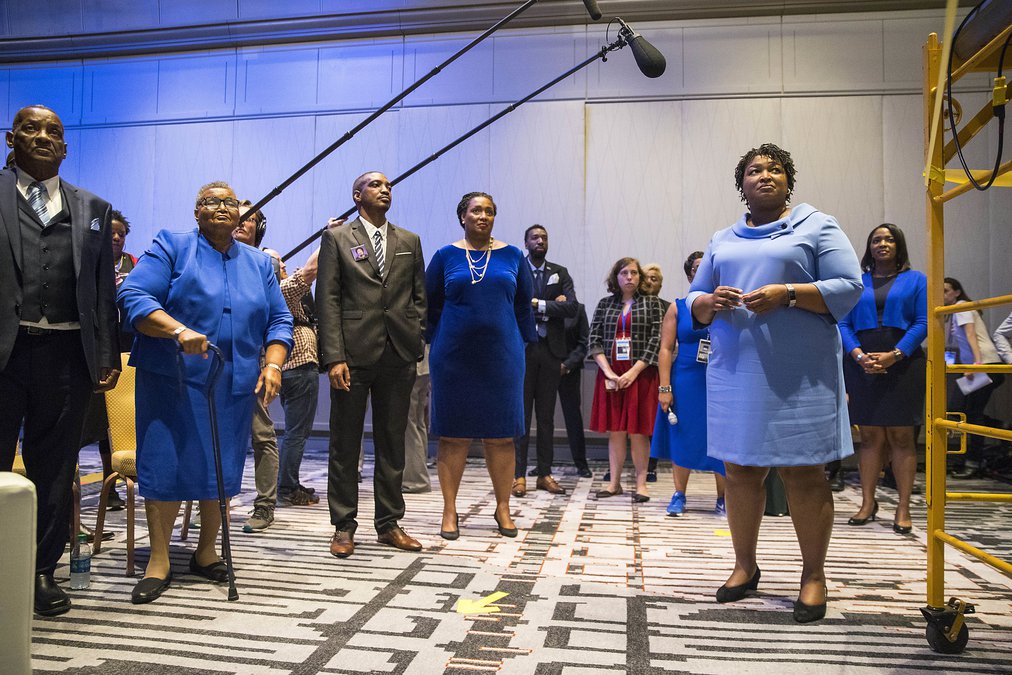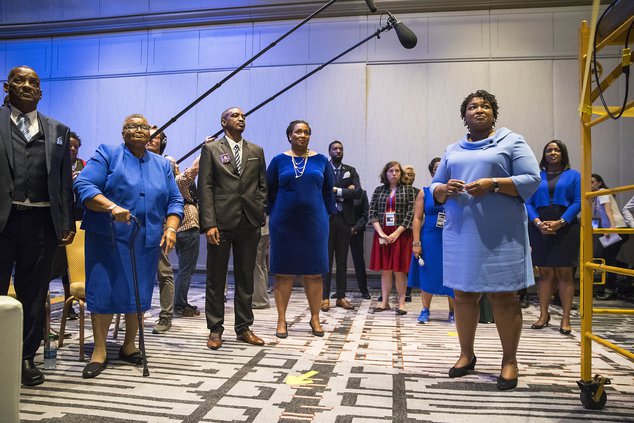Republican Brian Kemp’s campaign declared victory Wednesday in the Georgia governor’s race, though Democrat Stacey Abrams insists that enough ballots remain to leave open the possibility of a runoff.
The Associated Press has not called the contest.
Ryan Mahoney, a top Kemp campaign adviser, told reporters in a conference call that the numbers show Abrams can’t win and a runoff won’t happen. Mahoney say Kemp is certain of victory and preparing to take office in January.
“We are declaring victory,” Mahoney said. Another campaign official, Austin Chambers, added: “The message here is pretty simple: This election is over, and the results are clear.”
Kemp, Georgia’s secretary of state, was not on the call.
Other elected officials swiftly moved to back Kemp’s claim, with U.S. Sen. David Perdue saying in a press release that “Georgians sent a clear message that they are committed to keeping our state on track,” and Georgia Speaker of the House David Ralston said, “I know Governor Kemp will be an invaluable partner in the work ahead.”
The move comes after a tense standoff that leaves open the possibility of litigation, as Abrams’ campaign spent the day pushing for the continued counting of absentee, mail-in and provisional ballots and renewing its concerns that Kemp remains the chief elections officer supervising his own election.
Statewide
Brian Kemp: 50.33%
Stacey Abrams: 48.72%
Ted Metz: 0.95%
With 100 percent of precincts reporting as of 6 p.m. Nov. 7.
Hall County
Brian Kemp: 73.3%
Stacey Abrams: 25.5%
Ted Metz: 1.2%


In a conference call with reporters Wednesday evening, Abrams’ campaign manager Lauren Groh-Wargo made it clear the campaign was not giving up and did not recognize Kemp’s self-proclaimed victory.
“We are here tonight to say that we do not accept that,” Groh-Wargo said.
The Abrams campaign said Kemp’s camp did not notify it of his intent to declare himself the victor, and was withholding what should be public information, including the actual number of outstanding provisional ballots.
“He is using the secretary of state’s office as an arm of his campaign apparatus,” Groh-Wargo said.
Abrams campaign chair Allegra Lawrence Hardy detailed a robust legal team preparing for litigation. The attorneys are “looking at all options,” Hardy said.
The Abrams campaign is focused on finding enough votes to force a recount or a runoff against Kemp, which the team believes it can win. Finding out how many ballots remain uncounted is at the core of that strategy.
“They deserve to be counted before the secretary of state crowns himself governor,” Groh-Wargo said.
The Abrams camp was also concerned with absentee ballots expected from counties affected by Hurricane Michael, saying some mail from the Albany area had been routed through Tallahassee due to storm damage.
With reported votes exceeding 3.9 million — almost 95 percent of Georgia’s 2016 presidential turnout — Kemp has just more than 50 percent.
Kemp’s spokeswoman in the secretary of state’s office, Candice Broce, said that by Wednesday afternoon the number of uncounted absentee and mail-in ballots was less than 2,000 — with her boss still above the 50 percent threshold. Broce said about 22,000 provisional ballots have yet to be processed, according to a canvass of county officials across the state.
Mahoney asserted that those numbers make it impossible for Abrams to pick up enough votes to deny Kemp an outright victory.
Kemp’s office has not released a county-by-county breakdown of provisional ballots, but Abrams’ campaign said they believe they are concentrated in metro Atlanta counties where Abrams won a large share of the vote.
Carl Cavalli, a professor of political science at the University of North Georgia, said voters may have mailed in their ballots due to a variety of factors, such as long lines at polling places and a perception that voting machines may be unreliable. Forecasted severe weather on Election Day could have also driven voters to send in their ballots instead, he said.
“I think fears of problems with voting machines, word getting around about the general convenience of absentee ballots,” Cavalli said. “Essentially, we have mail-in voting in the state of Georgia. … You don’t need a reason (to vote absentee), so people can do it whenever they want to.”
Many of the outstanding ballots are in the metro Atlanta area, a region that has seen high turnout for Abrams. In Gwinnett County, Abrams won with 56 percent of the vote. In DeKalb County, she received 83 percent of votes.
That shift to the left, which some call the “blue wave,” did not make its way north to Hall County, where Kemp got 73 percent of the vote.
Cavalli also noted that U.S. Rep. Doug Collins, R-Gainesville, held strong in the conservative 9th District, getting almost 80 percent of the vote.
Increasing diversity, particularly with a growing Hispanic population, may shift the vote in the future, though, Cavalli said.
If a runoff is necessary, the second round would take place Dec. 4, extending one of the marquee races of the November midterms as Abrams tries to become the first black woman elected governor in American history while Kemp looks to maintain the GOP’s domination in a state evolving into a genuine two-party battleground.
Either way, Georgians are sure to see a new round of bitter recriminations over ballot access and voting rights that could leave some voters questioning the outcome of a contest both nominees have described as a “battle for the soul of our state.”
“This is why we had a steady drumbeat for him to resign,” Groh-Wargo said Wednesday, noting Abrams’ and others’ warnings about the potential for chaos in a tight election. “Here we are,” she said.
Kemp, 54, told his supporters early Wednesday that “there are votes left to count, but we have a very strong lead. … The math is on our side to win this election.”
A nonprofit group, Protect Democracy, filed a lawsuit Tuesday seeking to keep Kemp from being involved in counting votes, certifying results or any runoff or recount. Broce called it a “twelfth-hour stunt.”
State law gives counties until Tuesday to complete vote counts and certify results to state elections officials. The statewide certification must follow by Nov. 20.
But confusion also surrounded that timetable, with a release from the Secretary of State’s office saying the election would be certified “no later than Wednesday, November 14,” while Groh-Wargo maintained that counties must certify by Monday, which is a federal holiday.
The indefinite extension in Georgia focuses a spotlight on a race that already has drawn massive investments of time, money and star power — from President Donald Trump and former President Barack Obama to media icon Oprah Winfrey.
Cavalli said that both Republicans and Democrats can thank Trump for high turnout in the election.
“I think the Donald Trump presidency has energized a lot of Democrats to become active in the process. I think also, you have the millennial generation, more and more of them reaching voting age,” Cavalli said. “This plus the general increase in polarization means more and more people are concerned, and concerned people always are much more likely to go out and vote.”
For now, the only thing certain about the vote for governor is that the ultimate outcome is uncertain. Or as Hardy said Wednesday night:
“Please stay tuned.”
Times reporter Megan Reed and news editor Nate McCullough contributed to this report.

